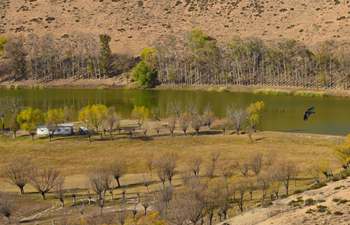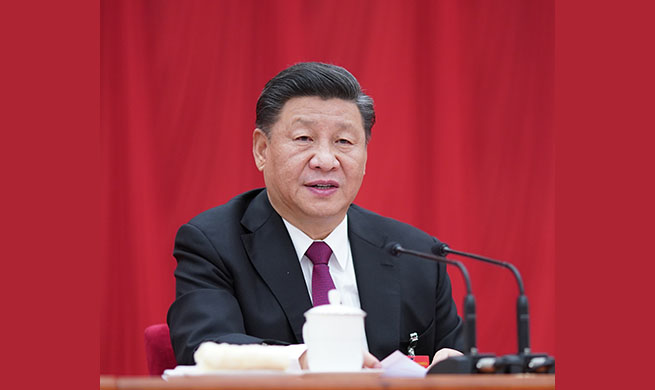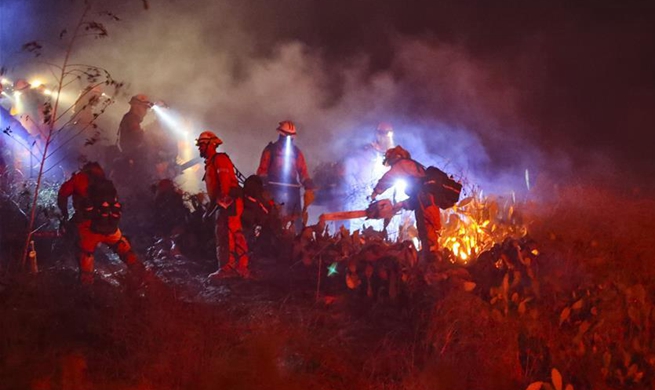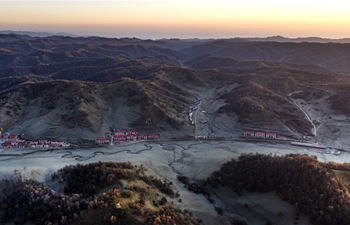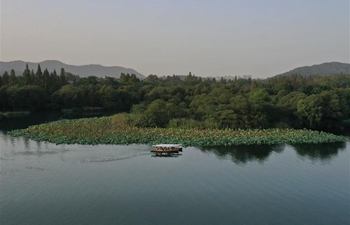by Burak Akinci
ANKARA, Oct. 31 (Xinhua) -- As Turkey and Russia have taken control of northeastern Syria after signing an agreement, the aspiration of Syrian Kurdish forces for self rule in the region has faded away, analysts said.
A deal struck last week in the Russian resort town of Sochi between Russian President Vladimir Putin and his Turkish counterpart Recep Tayyip Erdogan forced the Kurdish People's Protection Units (YPG) militia, which weeks ago controlled a third of Syria and most of the country's resources, to abandon a large swath of territory.
According to the deal, Turkey will suspend the offensive it launched early October to allow the pullout of the Kurds from the region, but the Turkish forces will remain deployed in an area of 120 km wide and 32 km deep dubbed as a "safe zone".
However, the Turkish leader on Wednesday told reporters that the withdrawal of the Kurdish militia under the Sochi agreement has not been completed and warned of resuming the military operation and expanding the area already under Turkish control.
"The idea of an autonomous region under YPG self-governance no longer exists. Our military operation was targeting terrorists who intended to create a so-called self-ruled entity in northeastern Syria, which poses a security threat to our country," a Turkish government source, who requested to be anonymous, told Xinhua.
"One should not forget that the territory does not belong solely to the Kurds. The YPG has forced the Arabs out from the region, to establish what they called an autonomous region constituted of cantons," he said, criticizing also a "romanticized approach of the West" towards YPG's de-facto independence.
Kurdish-led forces took possession of the swath of territory in northern Syria from direct Syrian control in 2012 and defended it, with moral, financial and military support from the United States against the Islamic State (IS) militants, a move that gains international sympathy.
However, the YPG was deemed by Ankara as the Syrian offshoot of the outlawed Kurdistan Workers' Party (PKK), which has launched a decades-long armed campaign against Turkey and is designated as a terrorist organization by the United States, the EU and Turkey.
The armed Kurdish faction lost American support following U.S. President Donald Trump's abrupt decision to retreat U.S. troops from the Turkish-Syrian border, which paved the way for the Turkish operation to overwhelm the YPG.
The Sochi deal signaled a victory for Turkey, which rejects any idea of Kurdish autonomy along its border with Syria.
From now on, the Kurds will have only a very limited prominence in northeastern Syria, and Russia, Turkey and the Syrian government will fill the power void there.
The YPG fighters will have to work out a co-existence plan with the Russian-backed Syrian government army who may eventually use them to flush out the last pockets of rebels in northwest of the country.
"The YPG will no longer be able to operate in this region (northeastern Syria) as before," said Moscow-based Turkish analyst Kerim Has, who argued that Kurdish-led Syrian Democratic Forces (SDF) fighters who handed the areas to Turkish control would help the Syrian army to reclaim new swath of territory.
Meanwhile, the Sochi agreement does not set a specific date for Turkey's withdrawal from Syrian territory, which would allow Ankara to establish a buffer zone entirely under Turkish control.
Erdogan has been hoping to set up such a area to resettle millions of Syrian refugees currently living in Turkey, an ambitious project considered "unrealistic" by critics.
Although Turkey is considered a winner along with main foreign player Russia in its incursion gamble in Syria, it might unwillingly witness the Western legitimization of the Kurdish militia in light of the wide support that the YPG enjoyed in Western countries, warned Kerim Has.
"In the long term, this could be a headache for Turkey," he cautioned, echoing other analysts who believe that it may be challenging for Turkey to explain its positions amid the rising profile for SDF leader Mazlum Kobane in Washington.
Experts think that the YPG would want to continue tentative talks that it established back in 2018 with Damascus to preserve its remaining decentralized administration, but with a much weaker position.








